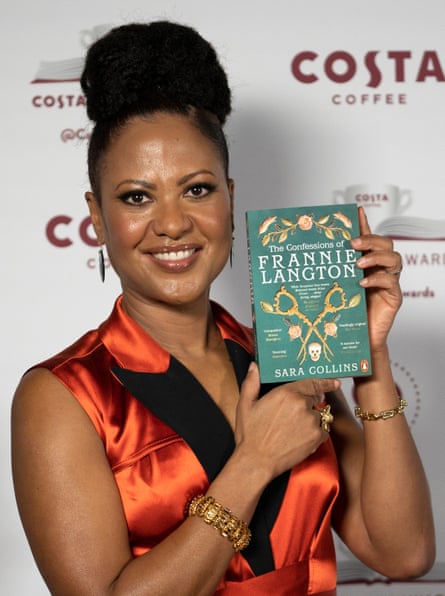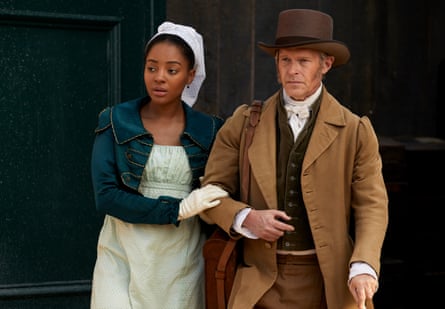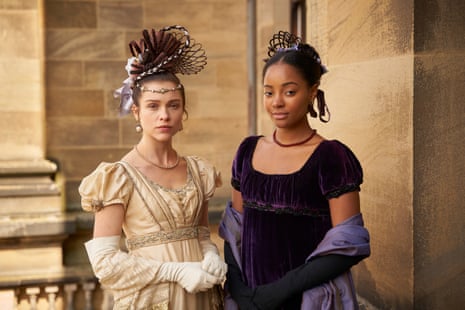‘I will not confess to something I don’t believe I have done.” Frannie Langton is a maid who has been charged with the murders of her masters after waking up in a dress soaked in blood. She can’t piece together what really happened, but she swears innocence. “I’m fed up of people like you deciding who I am or what I am as soon as you take one look at me,” she growls at her legal brief, who, like everybody else, assumes she did it. And with that, The Confessions of Frannie Langton promises one hell of a gutsy story.
Set in the 19th century, the programme stars Karla-Simone Spence as Frannie, who grew up on a plantation in Jamaica, then was brought to England and given to Marguerite (Sophie Cookson) and George Benham (Stephen Campbell Moore). “No doubt you’re thinking this will just be another one of those slave histories all sugared over with misery and despair,” she narrates. “It won’t be.” Indeed, this is a story about love; an unexpected and illicit affair with Marguerite (or “Madam”, as Frannie calls her).
Could Frannie really have killed her lover? Then again, who would believe a queer Black woman with an opium addiction? Over four episodes of flashbacks, twists, turns and cliffhangers, the truth will out. Hopefully.

Sara Collins, author of the award-winning novel that provided the source story, usually hates it when books are turned into TV. “They don’t tend to work,” she says from her home. “I’ve never loved an adaptation as much as the book.” That’s a fair enough opinion but it prompts the question: why did she say yes to adapting her own debut novel? “I fought myself about whether to do it,” she says. “But it would have been ridiculous to turn it down.” She has since taken quite the U-turn: “I want people to say: ‘Holy shit, that was good.’”
The success of the book and turnaround of the adaptation was rapid: after being published in 2019, The Confessions of Frannie Langton won the Costa first novel award months later, then was optioned the following year. Spence says she didn’t even get a chance to read it until the third round of auditions – and it made her sob. “Frannie is just fighting to tell her story,” she says.
Collins had never written a screenplay before, so she “tackled it like a lawyer” – probably because that was her profession. “I had to persuade myself I knew what I was doing,” she says. “I created a lot of colour-coded files. It felt a lot like going to court.”
Such a methodical approach makes sense; there’s a lot going on in this story. It’s a whodunnit period drama that encompasses slavery, queer romance, race and addiction. Collins, though, rejects such labels: “I don’t see it as an LGBT novel and I don’t see it as a Black novel … it’s just a story about human beings.” The relationship between Frannie and Marguerite, she says, was the only thing that made sense. “When you think about who else was around – incredibly odious men … If I were in that household, Madam would have been the only option for me!”
Still, the fact is that stories with Black female leads are rare in period drama. With gothic romance classics such as Rebecca, Jane Eyre and Wuthering Heights being big influences, Collins wanted to put a Black woman centre stage. The era she chose was specifically between 1807 – the UK’s abolition of the international slave trade – and 1833, the emancipation, which gradually set all enslaved people free. “That was a good chance to put our memory of the empire on trial,” says Collins.

As Frannie’s tale unravels, we discover that she learned to read while growing up on the Jamaican plantation and was educated by her master, the irksome John Langton (Steven Mackintosh), who enlisted her help with his horrific “scientific research”. Although Frannie was a slave, Spence says she “had certain freedoms in terms of having more of a say in things – she felt she was higher stationed than everyone else.” So when Langton takes her to London, the reality of her captivity hits, especially when she hears of other Black people who have lived under their roof. “You people think you can come here and snatch the bread from an Englishman’s mouth!” shouts the housekeeper, who quickly puts Frannie to work.
The relationship with Marguerite, which fires up over a shared love of literature, is doomed from the off. She, too, is an oppressed woman married to an ogre out of convenience and unable to express her true intellect and talents. But, as Collins puts it, she has “an incredible privilege she’s not aware of. She’s so consumed with self-pity that she’s incapable of understanding another person’s pain.”
after newsletter promotion
If it sounds bleak, that’s because it is. There is one woman in Frannie’s life, however, whose loyalty never falters and who is sure to become a fan favourite: her friend Sal (Amarah-Jae St Aubyn), who runs a nearby brothel. “Being with Sal is the only time Frannie can be vulnerable,” says Spence, who adores the “big sister” character.
For Collins, Sal was a way of exploring the number of Black women who were famously independent and self-sufficient sex workers in the 19th century. “It subverts what we expect,” says Collins, “a Black woman in financial and emotional control. It’s a playful wink to what you expect from a slavery story: someone is going to get whipped but you don’t realise it’s going to be the white men.”
Ultimately, though, this is a great gothic romance. “It’s a love story as dark and twisted as the murders that happen at the end,” says Collins, who happily likens it to a “juicier” Jane Eyre (“if Jane had shagged the woman in the attic … ”). Spence sums it up with Frannie’s own words to Madam: “Men write so that they can separate themselves from history – but women write to join it.”
